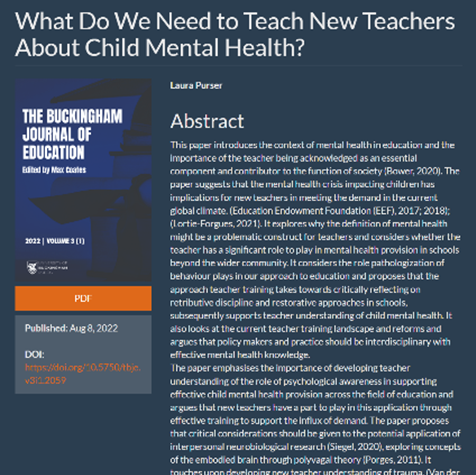Laura Purser (Academic Programme Director – BA Primary Education QTS, Lecturer in Education, University of Reading), has written an article exploring the research literature around mental health and teacher training, titled ‘What do we need to teach new teachers about child mental health?’. Laura’s article has recently been published in The Buckingham Journal of Education, Accessible link: http://www.ubplj.org/index.php/TBJE/article/view/2059
It reviews the literature surrounding mental health discourse in education, emphasising that the mental health crisis impacting children, has implications for new teachers in meeting the stretched global demand. It considers the significant role teachers play in mental health provision in schools beyond the wider community. It explores why the definition of mental health might be a problematic construct stemming from the medical model, emphasising over pathologization of behaviour. It looks at the current teacher training landscape and reforms, arguing that policy makers and practice should be interdisciplinary with effective mental health knowledge.
The article emphasises the importance of developing teacher understanding of the role of psychological awareness in supporting effective child mental health provision, and proposes that critical considerations should be given to the potential application of interpersonal neurobiological research (Siegel, 2020) and concepts of the embodied brain through polyvagal theory (Porges, 2011). The evidence base stresses the importance of psychological and physiological safety of the nervous system and how teachers can support this through coregulation of emotion, using trauma informed practices to manage dysregulation and behavioural approaches in school.
Overall, the article aims to support the role of initial teacher training education (ITT/ITE) in developing teacher confidence and competencies, developing efficacy to meet the needs of child mental health in schools. The research focus beyond the scope of this article feeds Laura’s EdD project, designing and implementing a new cohesive, integrative training programme, incorporating key messages from Interpersonal Neurobiology. This training aims to become effectively sequenced and embedded in an ITE curriculum to support teachers to inform their critically reflective practice, supporting child mental health and co-currently their own.
Key Points:
- The importance of clarifying our language terms, impacting perception of well-being and mental health provision and consider what our definitions mean in our individual and collective contexts that inform our approaches to behaviour, inclusion and well-being practices and policies.
- Consider how the medical model feeds into pathologization of behaviours and the ways educators can look to normalise and conceptually frame emotional dysregulation to support positive mental health, reflecting on therapeutic restorative justice over retributive approaches.
- Explores the ways we can embed psychological and physiological safety through awareness of the nervous system (ANS) and the embodied brain, drawing on Interpersonal Neurobiology (IPNB), Polyvagal Theory and Trauma Informed Practice.
- How we can use the research evidence base to inform our ITE curriculum provision for mental health understanding to inform provision at differing educational levels: HE, school and within the wider community to facilitate a systems thinking approach to mental health.
 Laura continues to speak at conferences, deliver in school training and HE lecturing on how we can embed effective mental health provision within education
Laura continues to speak at conferences, deliver in school training and HE lecturing on how we can embed effective mental health provision within education
Laura tweets at @laurapurser1.


1 comments on “What Do We Need To Teach New Teachers About Child Mental Health?”